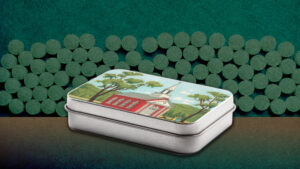There was a time when shame didn’t exist. Man and woman walked freely with God and one another—perfectly vulnerable and without shame (Gen. 2:25). But then sin entered the paradisiacal landscape. And with sin came the immediate hiding of shame.
The man and woman tried to cover themselves from each other, and they hid from God when he came looking for them. As he exposed the sin, they blamed one another, then the serpent. Eden shattered, and they were expelled from paradise. But not without one seemingly small act of grace—God covered them with adequate clothing (Gen. 3:21). This act pictures the future, greater covering of shame humanity would need—clothing in robes of righteousness instead of the garments of sin that cloak us with shame.
Unclean Made Clean

Throughout the history of a redeemed and rebellious people, we see shame alongside sin and guilt. Guilt was atoned for through regular sacrifices, pointing to the Lamb of God who would be the ultimate and final sacrificial offering for a sinful people. Shame often shows up in the realm of the “unclean,” a category in Levitical law that went beyond the uncleanness brought by sin. For example, a person with various types of skin disease could be deemed unclean by a priest (Lev. 13:1–59). There were shameful consequences for being pronounced unclean: “He shall remain unclean as long as he has the disease. . . . He shall live alone. His dwelling shall be outside the camp” (Lev. 13:46). What a picture of what those of us who dwell in shame feel—an aloneness and an exclusion from “the camp,” whether that camp be defined as our family, community, neighborhood, school, or church. Shame pronounces us “unclean,” and we’re separated and excluded.
In Old Testament days, to be cleansed from uncleanness necessitated a priest and a sacrifice. As we move through the Bible, there’s an endless succession of both priests and sacrifices. Until we reach Jesus. Hebrews declares Jesus to be both the great, eternal high priest and the final sacrifice:
The former priests were many in number, because they were prevented by death from continuing in office, but he [Jesus] holds his priesthood permanently, because he continues forever. . . . He has no need, like those high priests, to offer sacrifices daily, first for his own sins and then for those of the people, since he did this once for all when he offered up himself. (Heb. 7:23–24, 27)
We can therefore put to rest our guilt, and our shame, forever. Jesus took on our sin, giving us his robes of righteousness, and he bore the weight of our deepest shame—the longing for relationship with our Creator God.
As Jesus walked among us, we see him again and again going to the ones filled with shame, labeled “unclean.” He doesn’t avoid them, but welcomes them and exchanges their uncleanness for his purity. Consider the ten lepers who were healed by touching Jesus and the woman bleeding for years who simply touched the edge of his garment. Jesus heals shame over and over again. Also think of the way he responded to Simon and the disciples who criticized the extravagant anointing by the “sinful woman.” He defended her, removing her shame by essentially saying, “She’s with me, and you should be ashamed of yourselves for not honoring me the way she has.”
Spirit-Filled Freedom
So what does it mean for us as Christians who have the Spirit of Jesus dwelling within us? We are free from shame. We are no longer excluded, left “outside the camp” and left alone in our shame—whether it’s shame as a result of our own sin, another’s sin against us, or a characteristic culturally deemed as shameworthy. What the Spirit desires—the freedom for which we have been set free (Gal. 5:1)—is opposed to the slavery shame tries to force on us. Shame says you’re alone and excluded. The Spirit is sent to remind us of all the Father teaches us; to remind us we’re not alone like orphans but are sons like Jesus, who have been set free from condemnation (John 14:26; Rom. 8:1–2, 15–16).
The Spirit frees us to speak up when shame wants to silence us.
The Spirit insists we belong to the community of the redeemed when shame whispers we’re too bad to be accepted or loved.
The Spirit gives us courage to welcome others whom our culture or churches might deem “unclean,” knowing this reflects our experience of grace that chased away our own shame.
Will we ever be entirely free of shame’s presence as in Eden? Yes—but not yet. There will be a day when all who’ve hoped in Jesus will be clothed in perfect purity and a radiant bridal garment (Rev. 19:7–8; 21:2). Until then, we will be practicing the freedom we’ve been given in Jesus through the Spirit. Our collective Edenic memory of life before shame will be our future, forever destiny. Let this hope give you courage to fight shame’s enslavement through the power of the Spirit today.
Download your free Christmas playlist by TGC editor Brett McCracken!
 It’s that time of year, when the world falls in love—with Christmas music! If you’re ready to immerse yourself in the sounds of the season, we’ve got a brand-new playlist for you. The Gospel Coalition’s free 2025 Christmas playlist is full of joyful, festive, and nostalgic songs to help you celebrate the sweetness of this sacred season.
It’s that time of year, when the world falls in love—with Christmas music! If you’re ready to immerse yourself in the sounds of the season, we’ve got a brand-new playlist for you. The Gospel Coalition’s free 2025 Christmas playlist is full of joyful, festive, and nostalgic songs to help you celebrate the sweetness of this sacred season.
The 75 songs on this playlist are all recordings from at least 20 years ago—most of them from further back in the 1950s and 1960s. Each song has been thoughtfully selected by TGC Arts & Culture Editor Brett McCracken to cultivate a fun but meaningful mix of vintage Christmas vibes.
To start listening to this free resource, simply click below to receive your link to the private playlist on Spotify or Apple Music.


































